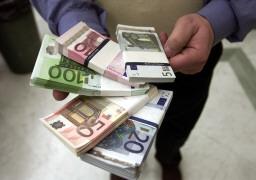National statistics bureau Istat made it official on Friday that the Italian economy was in a recession, the first since 2005 and the worst since the end of 1992 and the start of 1993.
According to Istat, GDP fell 0.5% in the third quarter compared to the previous quarter and 0.9% compared to the same quarter in 2007.
The 0.5% drop followed a quarterly decline of 0.4% in the second quarter and was greater than the 0.3% retreat Istat had been expecting.
The technical definition of a recession is when GDP falls for two quarters in a row.
The 15-nation eurozone also fell into a recession in the third quarter with average GDP down 0.2% for the second quarter in a row.
This was in part due to a 0.5% GDP drop for Germany, Europe's biggest economy.
Britain, which is not part of the eurozone, also saw its GDP fall by 0.5 in the third quarter.
Average GDP for the full 27-nation European Union retreated by 0.2% but this did not indicate a recession because there was zero growth, thus no decline, in the second quarter.
Even though the news on the economy is not good, and could get worse, the head of Italy's powerful industrial employers' association Confindustria, Emma Marcegaglia, said ''it's best to avoid any panic''.
''There is a recession in Europe and there may even be a global one and things could get even worse in the coming months. But this situation will end and growth will return,'' she said.
''What is important now is to support businesses and low-income families,'' the Confindustria chief added.
Marcegaglia recalled that Confindustria had already presented the government its suggestions to boost the economy which included cutting corporate taxes, eliminating tax on reinvested profits and embarking on important infrastructure projects.
''These measures will help Italy tackle and pull through the crisis,'' she claimed.
One of Italy's leading consumer rights groups, Codacons, said the Istat GDP figures underscored the need to boost the available income families had for spending.
The GDP figures, Codacons observed, ''are very worrisome and confirm that Italy is in a full recession which is involving all sectors including agriculture, industry and services''.
According to Codacons, ''it is totally useless for the government to help business, it would be just money wasted. Why help enterprises when they cannot sell their products because consumers don't have any cash to buy them?''.
It was Codacons' view that ''if we want to deal with this crisis in the short term we need to first help families make it to the end of the month''.
''Only by boosting consumer spending will the business sector be able to pull out of the crisis, thanks to a rise in orders,'' Codacons added.
Among the ways consumer spending could be boosted, Codacons said, was to move up the annual post-Christmas sales to before the holiday.
Despite the bad news on the GDP front, European stock markets rallied on Friday in part due to the fact that the confirmation of the recession had been expected and in part thanks to several better-than-expected third quarter corporate reports.
However, it was not clear how long this would last after reports came in from the United States that retail sales in October were down 2.8%, much worse than expected.









